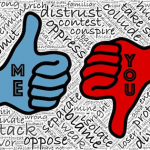
LUKE MOON (current Evangelical Christian): I’ve been having a lengthy discussion over the weekend on my FB. My overarching point was that since all government power is coercive (always holding a gun) it cannot properly address issues of poverty that do not stem from abuses of power (injustice). If a person is in poverty because of stolen wages or some other form of abuse, then it needs to be handled by the government, but if it more systemic, then let other institutions (church/civil society) handle issues of poverty. I’d love your thoughts on this.
FRANK SCHAEFFER (former Evangelical Christian): I agree with much of what you say. But to me, government is really just extended community, so I don’t see the divide as so black and white between “other institutions” and government. After all, churches are tax-deductible, so city governments lose a fortune because of church exemptions. Besides, which when you look at the real numbers on the big issues like Medicaid, Social Security and Medicare (trillions), with all due respect… I’ve never seen any serious evidence that anything but government has the muscle to pick up the real tab. When evangelicals and others actually invite the homeless they meet home to live with them, or pay for all the AIDS treatments… I’ll believe it. Soup kitchens in Detroit and NGOs in Haiti are nice, but however well-intentioned, they don’t even scratch the surface. And by the way, living in New England in formerly Puritan towns (and with an ancestor who sailed on the Mayflower), it’s clear that all the founders’ laws about sharing public space, taxation, church attendance and so forth would be regarded by today’s evangelicals (at least the Trumped ones) as “socialism.” So much for our “capitalist” Christian founders. They enforced very strict charity laws, sharing of public farmland, communal grazing greens for cattle and so forth. The Koch brothers would have hated them!
Luke: Ha ha, had to throw in the eeevil Koch brothers there at the end…. Seriously, though, since Social Security and Medicare are intended to be forced savings accounts, I don’t see that as a rebuke of the model. I see it in black and white terms more from a position of how to think about the role of the state vs. the role of the church. To me, the church’s job is mercy and the state’s job is justice. Lots of bad things happen when those roles get mixed up, i.e. Crusades (the church bearing the sword) and failed welfare programs (the state trying to be merciful). I’m willing to expand the church category to include civil society, synagogues, mosques, and so on.
Frank: Well the Romans would have had no empire if you’d been in charge. Their genius was in extending full citizenship to the people they invaded after subduing them and giving them full rights, which BTW the Apostle Paul used in order to take his case (and the gospel) all the way to Rome. Those citizenship rights included fair wages, bread and entertainment provided by the state…and this was the way the Roman Catholic Church interpreted the law for centuries after, too. There were church/state laws on what you could charge for bread and so on. In other words, a regulated economy in order to defend the poor was what church and state united to enforce. That was the idea anyway. Your notion is very American and very new. I bring this up because so many clueless American evangelicals say they want to “return” to a more traditional Christian society. If they ever did, they’d think they were in a communist state. And seriously, to hand these functions to the church (what church by the way do you mean — there are thousands of denominations and home Bible churches) these days just means people die. Do the math. When church and state were one–for most of what Steve Bannon types call Judeo-Christian history– no one would have had a clue about what you are saying. The idea that the state and church were separate is an American invention not shared anywhere else in Christian history when folks were lots more observant than even you are, let alone most Americans. That’s why Scandinavia became so effortlessly socialist. The Lutheran Church and Lutheran state were already one as a welfare state.
Luke: There wouldn’t be any empires if I was in charge :- ) The separation of powers is rooted in the Bible. Moses and Aaron. King Uzziah getting struck with leprosy for thinking he could offer the sacrifice. Jesus, render unto Caesar… Jesus to Peter at his arrest. Paul in Romans 13 and Peter in 1 Peter 2. All of these point to a separation of powers not being an American invention, but rather God’s design. The church should never bear the sword (as an institution), the state always does. This is a good place to start when thinking about politics through a Christian lens.
Frank: You have to be kidding. You’re looking to the Bible account of ancient Israel as a guide to a modern international economy?? Did you start drinking early today?
Luke: I am the Evangelical in the “Mix” so, yeah, I look to the bible as an excellent model of lots of things, including political philosophy. I’m a little surprised that you didn’t agree with the principle starting point. The post evangelicals should be excited that the church’s power is limited. Of course they would be less excited that the state power is limited too.
Frank: Be consistent. Next time you or your wife or child is ill, check the Bible for the version of oncology that helps most. Good luck!
Luke: Come on. All political philosophy is rooted in some ancient text. Our nation’s political philosophy is rooted in Jerusalem, Athens, and Rome.
Frank: Is that why evangelicals are supporting Trump even now? Chapter and verse please on the fact that Trump has reverted from lavish promise-maker mode to his MO as a failing and flailing plutocrat/autocrat with an agenda that steamrolls the working class and poor as it destroys their most essential programs. Moreover, Trump wants to fund the military instead of medical care and education. Not very biblical and not in any other “ancient text” I know either, with the exception of the books by the great late Bible teacher Ayn Rand. We’re out of words… again… want last one?
Luke: Sure… I’m not going to argue the finer points of the Trump budget. I do think the government should limit itself to fighting injustice (abuse of power) and that which benefits the common good. That is the basis of my political philosophy and it is rooted in the Bible. I’m just as committed to ending poverty as the most die hard liberal. I just think that poverty alleviation programs that are not relational (human to human) are never going to be able to help people live to their full potential. The current system is not working in part because it is not relational. Neighbor to neighbor, people to people, community to community will work infinitely better than giant robot (federal gov) to human.
Schaeffer & Moon is written on the fly in a real-time chat room format and lightly proofed by Patheos editors.









